sexless in the city
an open letter to white women on virtue signaling, blue bracelets, and the #4B movement.
i open my feed to a middle aged woman, her sunken eyes filling with tears. in her porcelain hands, she holds silver clippers. she sways as if she may be drunk, but she is only crying. i see myself in the furrow of her brow– the quake of her small sobs. her sordid arms fling across my screen as she tries, and fails, to trim the hair off of her round noggin:
“i am tired of doing things for men that don’t care about us. i am done being beautiful for them. i hope the men know that women’s pussies are closed for business“
tiktok baddies across america demand radical action following what they perceive to be a surprising election result. their inspiration? the 4B movement. created by south korean women, this subsect of radical feminism encourages women to swear off dating, getting married to, having sex with, or bearing children for men and, although both BIPOC and white creators have participated in #4B, i want to address the influx of positive commentary from white feminists. i call the sudden rise of white-women’s interest in sex strikes: #4B (taylor’s version).
#4B (taylor’s version) calls for an air-tight, communal strategy between a diverse scope of women. due to these particular requirements for the movement’s success, i am left skeptical. aren’t these the same women that, just three months ago, screamed “bring back pathetic men,” to the rooftops and romanticized the male bare-minimum? furthermore, how are we to organize an internet movement based on being “in community” when white women haven’t pioneered a successful political strategy since being racist suffragettes?
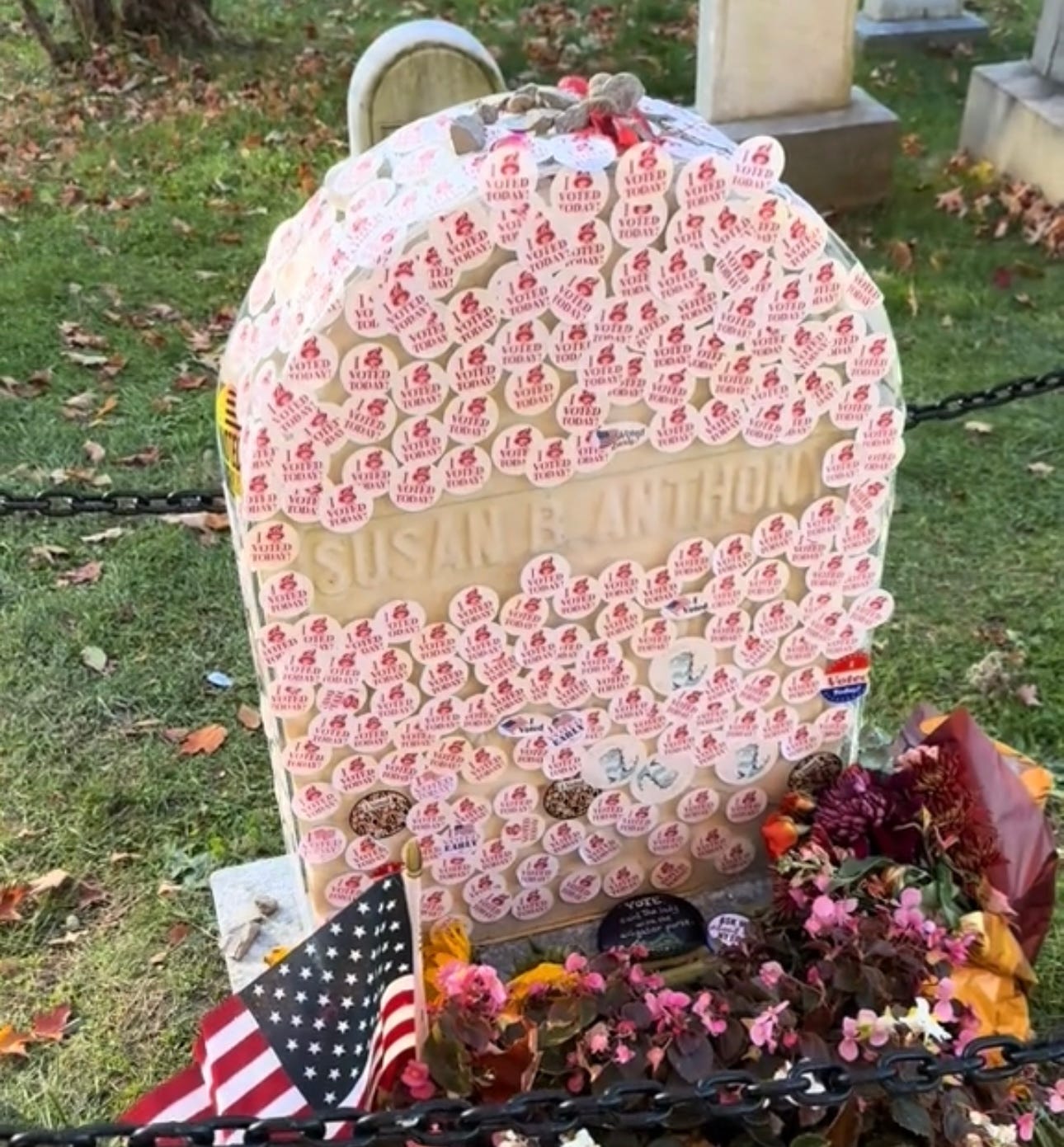
when we take men out of the equation, the numbers we have left are still dangerous, hateful, and red:
note to white women readers in particular: throughout this work, i will refer to you and i as “we.” i do so with reluctance because, despite our similarities, there are many differences between us. as you move to my land and occupy my beaches, i mourn for my missing and trafficked sisters beside the calm water. i cry for my aunty that lives in the streets of Mākaha because you live in our houses. i rage at the ‘slutty hula-girl’ you dressed up as for halloween. i giggle when you ask to shorten my name as you address me. no, you can’t.
i group us together as a reminder. we benefit from the same rooms in the same house. i do so because i can already *smell* the comments i will get on this post:
i must continue to emphasize our proximity to one another. this is a safeguard– a reminder that, when you inevitably turn on me for calling you to action, your tears will fall on deaf ears. i know both the hardships, the ease, and the power of being in a white woman’s body. i am here, in all my complexity, with both the gall and the time. i am not fooled.
i don’t claim to know your story, but here is mine: i am a Hawaiian, Indigenous woman who also happens to be white. over the years, i have worked hard to de-indoctrinate myself from what white womanhood provides me. in true mixed-kid fashion, i wrestled with my identity from childhood but became most aware after attending college on the mainland. while i will never deny my Indigenousness, i accept that unlearning white supremacy is a lifelong effort. i am certain of my capacity to, both, perpetuate and experience harm through systems that i did not create. through this acknowledgment, i identify the bold writing on the wall: our solutions to healing the ism’s of the world cannot also be our scapegoat.
SEX STRIKES, GREEK PLAYS, AND RACE:
erin tansimore’s article the complicated success of sex strikes, delves into the histories of various sex protests around the world. sex as resistance can be seen as early as 411 bc, when aristophones wrote the greek comedy lysistrata.1 following the main character’s campaign for women to withhold sex from their husbands in protest of the peloponnesian war, lysistrata utilizes humor and erection jokes1 more than actually analyzing bio-essentialist protest’s failures and successes.2
as for sex protest’s successes, tansimore identifies the Iroquois boycott as demonstrated in 1600s turtle island. due to violence perpetrated through various wars in which women played no part, the Indigenous women of the Iroquois placed a boycott on sex and child rearing. their men listened to this protest and, due to their matrilineal cultural structure, they were awarded the right to provide input on wars moving forward.1 seems simple enough, right? wrong.
tansimore points out that the Iroquois boycott was particularly powerful due to their “belief that women held a deeper knowledge.. than men ever could.”2 it is no surprise, then, that they organized with ease. what the Korean 4B movement and the Iroquois boycott have in common are shared, cultural ideals and an equitable framework toward approaching political movements.
white women’s sudden interest in withholding sex gives much less iroquois boycott and more aristophanes. tansimore emphasizes that “in order for sex strikes to be successful, women must have a space in which they feel safe and unthreatened”.1 what space do women of color feel safe and unthreatened in american society, let alone in a room full of white women?
as i gaze upon comedic discourse hailing out of white-woman-internet right now, a weight grows in the pit of my stomach. of all people, i support a woman’s right to choose and, as a woman who participates in comedic writing, i even encourage people to process their own subjugation through humor. alas, in facing the reality of our political climate, we cannot excuse this flippancy now. i am disappointed by the light heartedness with which white women are able to approach topics like sterilization when, in much recent history, doctors subjected Black and Indigenous women to forced hysterectomies at such a rate that it is considered modern genocide.3
how dare we demand that Black, Brown, and Indigenous women stop bearing the children who may bring change into this world?** how dare we propose a solution to misogyny that relegates the bodies of women who did not contribute to our demise? need i remind you the disparity between who elected the orange cheeto into office:
nevertheless, the internet discourse persists:
while i acknowledge that this video was made by woman who does not hold the same intersectionalities of whiteness– i cringe at the quickness with which internet speak infiltrates even the most half-baked political ideas. i see so clearly the ease in which white women will run wild with this: the “grandma-era” t-shirts in our etsy carts– the infographics forming in our canva protm accounts. i feel, deep in my bones, our collective urge to visit our nearest joanne’s for yarn.
history repeats itself. the pussy hat returns.
“inviting the girls and the gays” echoes in my ears, cutting my sternum with a knife.
GAY PEOPLE ARE NOT YOUR PURSE (FOR WEARING *OR* BUMPING):
sex strikes harbor a close relationship with lesbianism. in the 60s and 70s, radical feminism rose to the forefront of feminist praxis. from bra-burning to dyke worship, the second wave feminists positioned lesbianism as the moral ideal. they believed that lesbianism could operate solely on choice alone, and that choosing to eat pussy indicated peak dedication to their feminist cause. they deemed this movement: lesbian separatism.
in the book we are not one people, the authors describe lesbian separatism as “formless” and “scattered.”4 i agree. stephanie fransworth, an england-based queer journalist, muses on these same ideals:
“the concept of lesbianism as a political identity stems from the idea that to reject men is to reject the patriarchy… it is steeped in the idea that it is one of the truest forms of women reclaiming autonomy over their bodies and of being independent from men. however, this very idea is considerably flawed and erasive of women who are attracted to women.
to be a lesbian does not mean to reject men…it is also deeply saddening that anyone could take an identity based on attraction and love and try to turn it into something which equals rejection… being attracted to women is a much more beautiful experience than that.” 5
despite being through this dance before, there is a cacophony of white, gay nonsense brewing on tiktok. sandwiched between bisexual women claiming to “become the gayest she’s ever been” in response to the election results and
i am finding it hard to stay calm.
they say existence is protest, but what a privilege it is to cash in on this existence– to opt into queerness as protest– for tiktok likes? what a presumptuous and sheltered notion it is to assume this fight begins now and ends in four years? what an exciting phenomenon it is that, even with the threats to our human rights, we still do not see the oncoming threat enough to stop and think about the ramifications of our words?
even white lesbians, not 24 hours post-election results, have also had concerning reactions to straight women’s interest in female separatism:
let me level with these women: as a lesbian myself, i am a passive participant in #4B’s ideals and, while #4B (taylor’s version) does not yet call for political lesbianism as a core value, i despise this bastardization of protest. i annihilate the notion that i would provide open arms and an open mouth for 1) any bisexual who needed november 6th, 2024 to reframe their toxic permissiveness toward men or 2) straight women who perceive that they have a right to get-off. i refuse to be a pick-me dyke, emboldening a generation of rebranded incels and congratulating straight women after finally choosing *not* to fuck racists.
i reject the notion that we can offset our proximity to white supremacy by offering our white lesbianism as the solution. we cannot. we will not. this is a much more insidious problem than can be healed by women eating each other out.
WE’RE TWO SECONDS AWAY FROM BEING TERFS, BITCH!:
in addition to separatism incorrectly labeling sexuality as a political choice, the second wave also pushed an obscene amount of trans-exclusionary radical feminism. #4B is no exception.
in this tiktok by kyla hsia, she reflects on a transphobic comment she received after criticizing korea's 4B wave. although 4B and sex strikes do not derive from transphobia, we cannot ignore a movement’s ramifications on the general public. hsia explains that many 4B spaces require you to prove your female-ness through ID or pictures of your “adams apple”. i am not surprised that a movement that reduces female power to uterus function has the potential to incite rabid, transgender fear. in our quest to decenter men, white women reposition ourselves as breeding grounds and perpetuate rhetoric that our conservative counterparts love.
should we pursue this movement with no race, class or gender analysis, we are doomed to cause more harm than good to our most vulnerable populations.
THE PRESS IS MORE IMPORTANT NOW THAN EVER… ARE YOU READY?:
many white-woman writers are not ready for what is coming.
i think back to a recent scandal on substack regarding riley scarlett’s wonderful essay the bimbo feminists will pay for their crimes. scarlett provides a raw assessment of bimboism, detailing the movement as a predominantly white counter-culture and highlighting its tendency to infantilize rather than empower.6 the other white-girl substacks came for her. they called her harsh. they called her a misogynist. they called her woman-hating, but she was spitting. hard.
we are just not ready to give up our infantilization and with no worse timing, at that.
i offer another version of this meme for your consideration and for the conclusion of my rant:
now, more than ever, we will depend on our neighbor. but, i am not confident in our ability to be a neighbor in the first place.
i am afraid of the margaret attwood role play. i am afraid of the tone policing. i am afraid of the blue bracelet– the black square– the #4B– the assumption that shaving one’s head is peak political defiance. i am disgusted by the fact that, as white women, we are inextricably attached to measuring our progress by our ability to seem safe for Black and Indigenous people rather than being just that: safe.
to become a safe space for others, we must become comfortable with facing uncomfortable truths about ourselves. as someone harboring identity in both Indigenous and white spaces, i am not exempt. i have had to face many uncomfortable truths: my childhood guilt, the times i have micro-agressed, the difference in the treatment between my father and i, and the nuance of confronting my proximity to white supremacy from a young age. i realize more and more each day that, if my father moved my family and i to oregon in 2006 like he had planned, i could have been part of the 51% of us that voted for a rap*st dictat0r. so could you.
while it can feel safe to blame the results of this election on misogyny alone, we need to grow up and confront what landed us in this reality: white, cis-heteropatriarchy. we are facing an attack on all women’s rights, so it is okay to be emotional. however, to keep all women safe, we must throw our passivity, defensiveness, and empty tears in the bin. we must talk to our fucking selves before entering community. we must care about becoming safe people.
some of you will walk away from this essay defeated, but my hope is that most of you will feel inspired to dive head first into your own internal work. and, should that work require you to decenter men in the process (which i highly encourage and expect), i support you. regardless– as you fantasize about swapping the club for dinner parties and dick for pussy– please ask yourself:
“when i open my ornate doors– the ones with corinthian details and pristine, white trim and gold accents on the handle– what kind of women will i allow to eat at my table? and, should i permit them all, do i trust myself not to kick them out, screaming, crying, and begging for scraps?”
** addendum to the text: i have the privilege of holding many writer friends both online and in real life. one of my IRL friends, @kaiathepoet and i got to talking about my white-woman essay. she raised a really awesome point after reading it:
my intention toward bringing up BIPOC children as ‘change-makers’ was to emphasize the ridiculousness in white woman’s line of logic that all our problems lie in misogyny alone and, that if all women stop procreating, the root issue will be solved. when we look at the election numbers, it is clear that this is an intersectional, white supremacy issue— not an issue that can or should be solved by WOC. i hoped to emphasize that white, complacent motherhood is dangerous and cannot be passed off. kaia identified that my choice of language adds to an enterprise of racist expectation that positions POC to be our teachers, or that marginalized children must “be the change.” there is absolutely zero expectation toward BIPOC to do this liberation work. white people must do the work to dismantle white supremacy.
this is a classic example of how white writers can easily miss and further white supremacist/micro-aggressive language without intention. how ironic! this furthers my point: internal work, willingness to listen, and a hope to change is the path toward becoming safe people in our communities.
follow kaia! she has a literary magazine called banyan and she is a really awesome voice.
tansimore e. the complicated success of sex strikes [internet]. baker institute at juniata college. 2021. available from: https://wagingnonviolence.org/baker/2021/09/the-complicated-success-of-sex-strikes-lysistra/
aristophanes. lysistrata. indianapolis, in: hackett pub. co; 2003.
theobald b. a 1970 law led to the mass sterilization of native american women. that history still matters [internet]. time. time; 2019. available from: https://time.com/5737080/native-american-sterilization-history/
lee mj, r jarrod atchison. we are not one people : secession and separatism in american politics since 1776. new york, ny: oxford university press; 2022.
farnsworth s. being a lesbian is not a political choice [internet]. the queerness. 2016. available from: https://thequeerness.com/2016/01/30/being-a-lesbian-is-not-a-political-choice/
riley-scarlett. the bimbo feminists will pay for their crimes [internet]. substack.com. wire mother; 2024 [cited 2024 nov 9]. available from: https://girlunprovoked.substack.com/p/the-bimbo-feminists-will-pay-for








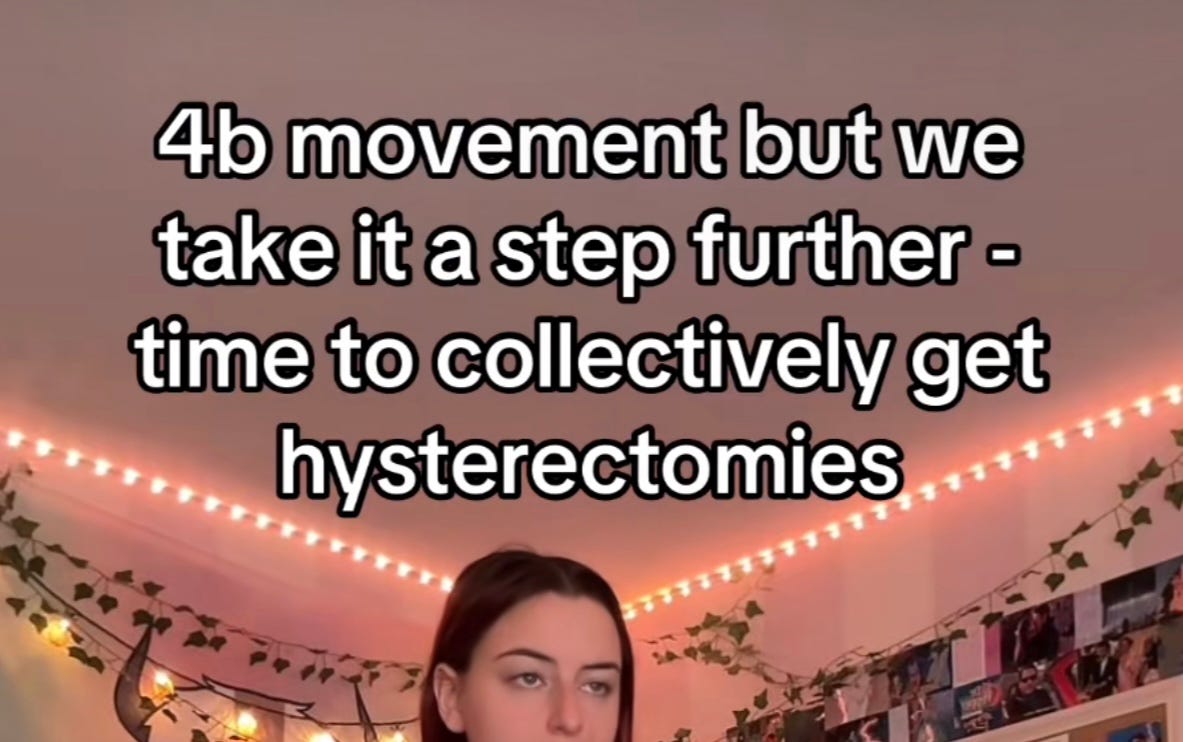




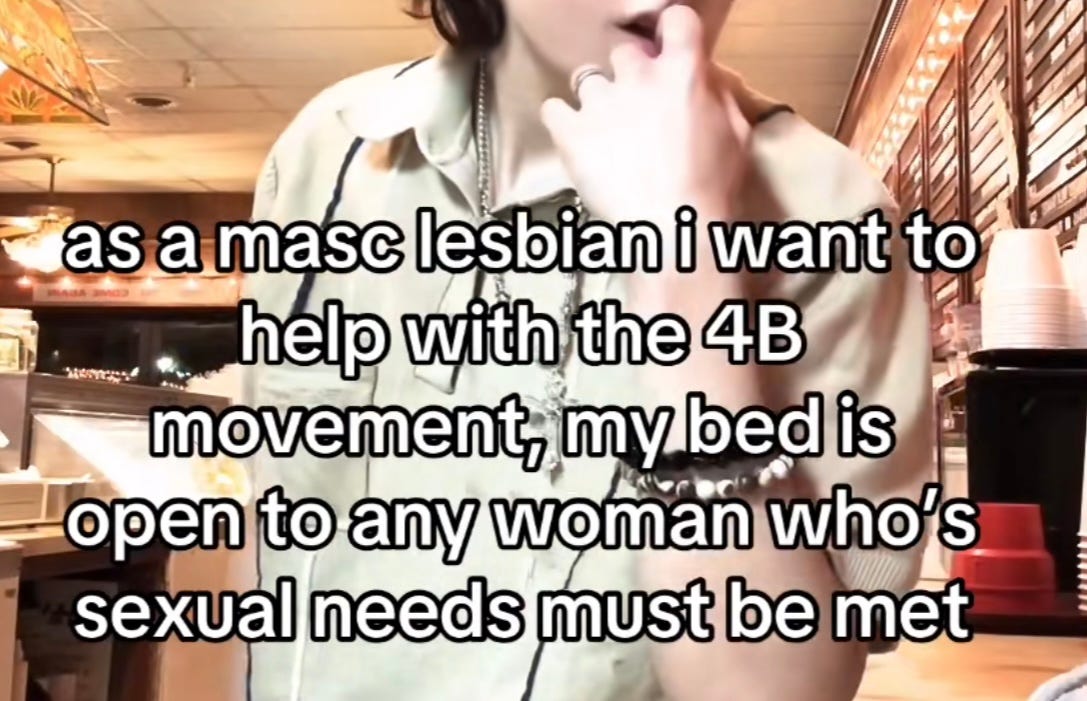

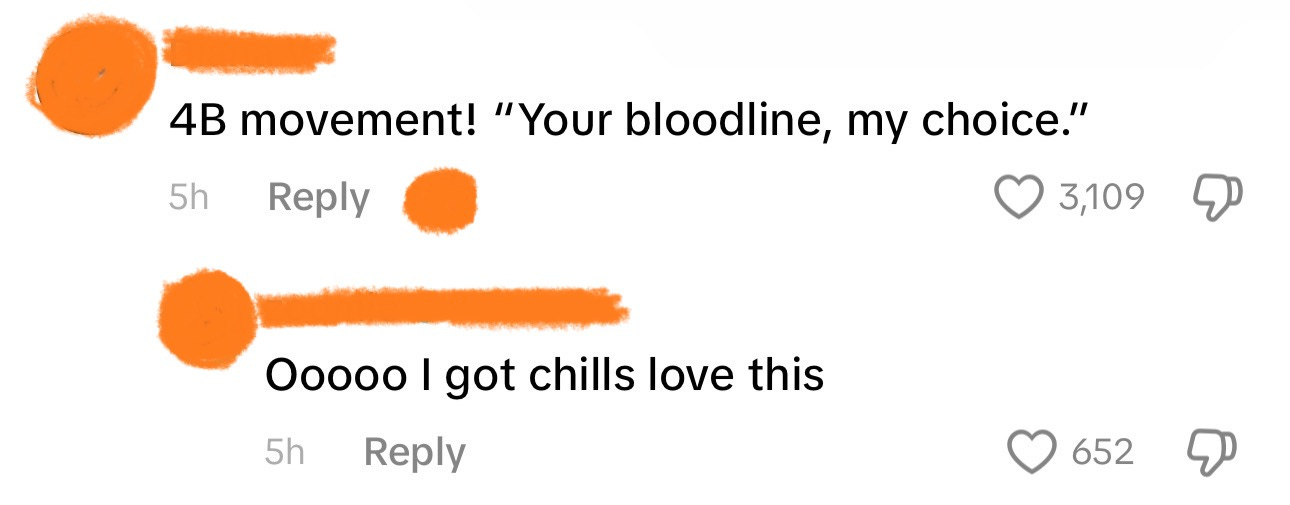

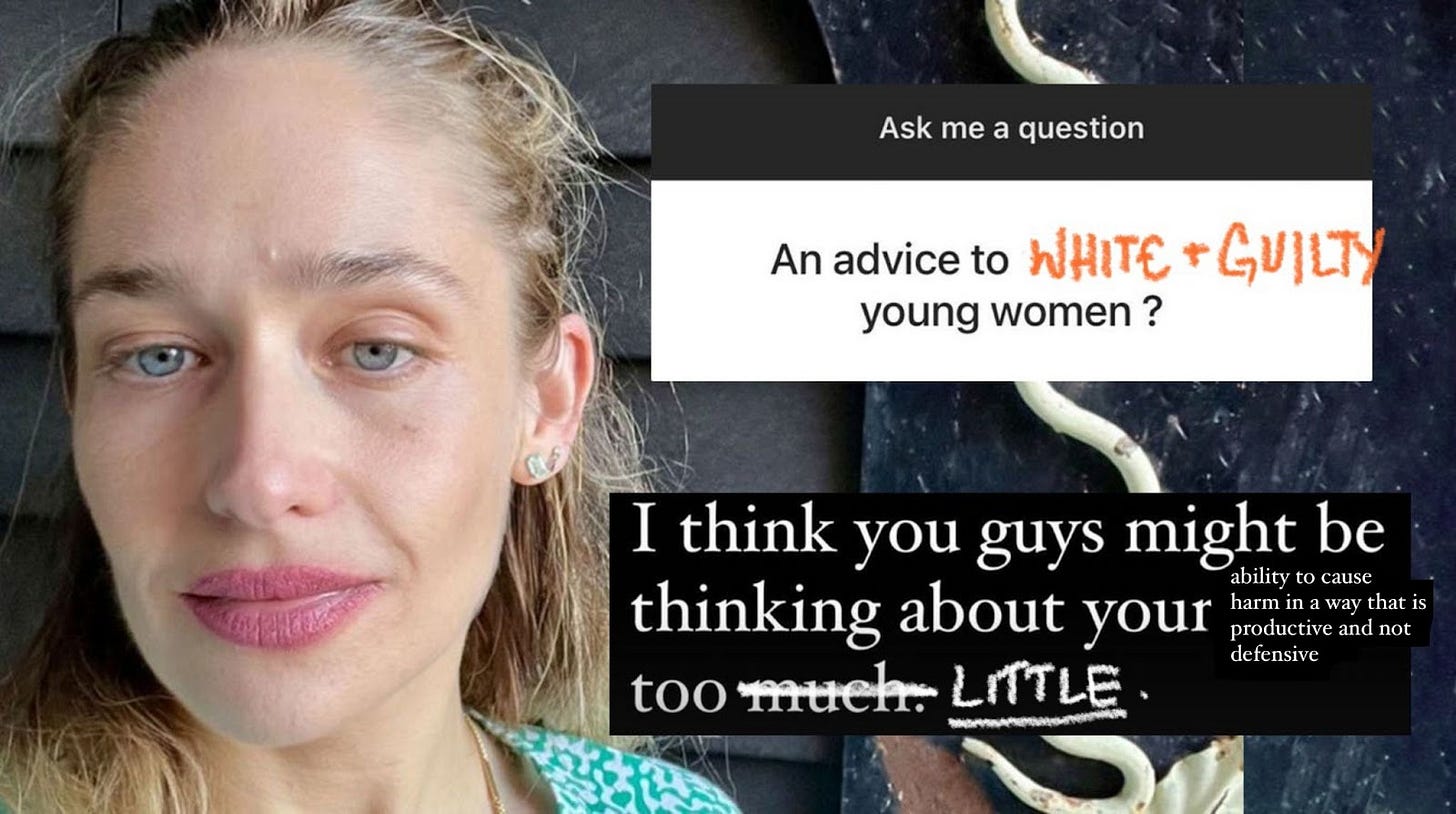
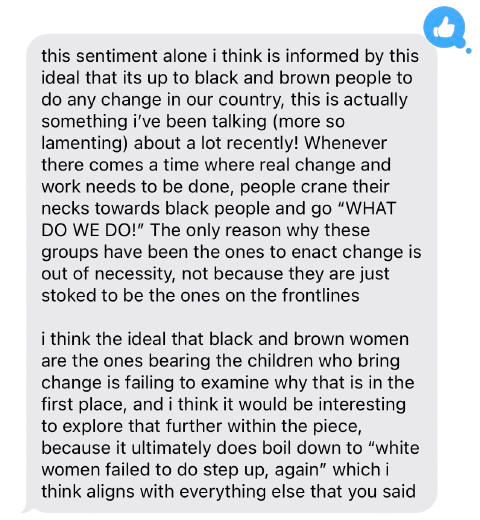
adored this so much.
reminded me abit of *some* white feminist women using lobotomy imagery as a sort of symbolic satire for misogyny while completely disregarding how before the lobotomy was used on white people (specifically white women and disabled people) it wad initially tested on thousands of nonwhite people until it wasnt *as* lethal.
This was beautiful! I loved the background you gave on indigenous sex protests as a sort-of overlooked reference point to the 4B movement (Taylor’s version, lol.) Super thought-provoking piece.